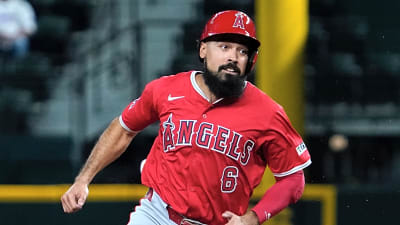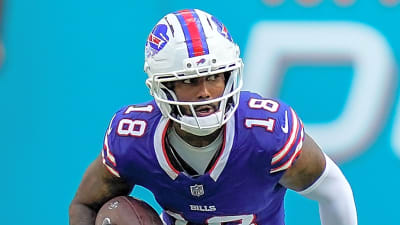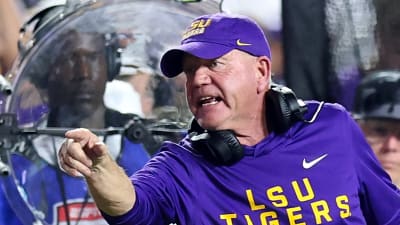
By and large, it’s been a disappointing year for the NHL’s seven Canadian teams. But there might not be one in a worse spot going forward than the Vancouver Canucks.
Even after narrowly defeating the Anaheim Ducks by a 5-4 score on Wednesday night, the Canucks occupy seventh place in the Pacific Division with a 10-12-2 record and 22 points through 24 games. The only Canadian team with a worse record is the Calgary Flames, who are well on their way to a lottery pick.
Sure, the Canucks also have decent lottery positioning themselves, but it’s precisely where they don’t want to be in their penultimate year of control over star defenseman Quinn Hughes. Even if they end up making a high pick next June, they’ll have a tough time getting someone even close to replicating the impact Hughes provides on a nightly basis. And now, as they continue to sputter into the second quarter of Hughes’ seventh full NHL season, the Canucks are approaching a crossroads.
Much ink has been spilled — including on this very website — about the prospect of the Edmonton Oilers eventually losing Connor McDavid if they can’t get over the hump, but at least they’ve made two runs to the Stanley Cup Final with him in the fold. The Canucks have never made it past the second round with Hughes, and they’ll be lucky to make the playoffs at all this year. It’s not looking good.
But much like their rivals in Calgary, the Canucks might end up being undone by their past and current unwillingness to properly embrace a full-on rebuild when given the opportunity. As the Sedin twins, Roberto Luongo, Ryan Kesler, and Alex Edler entered the twilights of their respective careers in the mid 2010s, the Canucks largely resisted calls to embark upon a teardown, instead attempting to “retool on the fly.”
But in their attempt to have it both ways, the Canucks bowed out in the first round of the 2015 playoffs before picking somewhat high — but not high enough — in the years that followed, resulting in a ludicrously top-heavy new core that has never been able to get the job done.
They hit a home run with Hughes, no doubt about it. Elias Pettersson has shown he can be a top-end center in this league, although it’s been a while since we’ve seen that from him on a consistent basis. Brock Boeser is a complementary second-line winger but not a franchise piece. Bo Horvat is long gone. And the less said about Jake Virtanen and Olli Juolevi, the better.
So, here we are. In an interview with Postmedia earlier this week, Canucks president Jim Rutherford set a goal for his management team for the rest of the season: “We have to make this team younger. We have to get this team going in a different direction from where we’ve been.” The comments from Rutherford came in the wake of GM Patrik Allvin sending out a memo putting it in plainer terms: The Canucks are open for business.
Pettersson and Boeser are both locked up for a long time, but naturally, all eyes are on Hughes, who is eligible to test free agency in 2027 and will undoubtedly command an enormous raise over his current $7.85 million cap hit. His brothers, Jack and Luke, both play for the New Jersey Devils, a fact of which Rutherford is well aware. By all accounts, Quinn has yet to make a decision on his future, and if he does end up leaving, it’ll start feeling a lot like 2014 again for Francesco Aquilini and Co. in Vancouver.
But in the immediate future, there’ll be some different names on the block in Vancouver. Rutherford has always been a bit of a maverick in NHL executive circles, one who has never shied away from doing his business well ahead of time, and it wouldn’t be surprising to see the Canucks begin their shakeup before the New Year.
Here are the three players on expiring contracts who could garner the largest returns, listed in order of increasing value, as the Canucks start to explore a change of direction.
3. Evander Kane
Acquired: Trade with Edmonton, 06/25/25
For how much: 2025 fourth-round pick (David Lewandowski)
Contract: $5.125 million AAV, UFA in 2026
In a sentence: Crash-and-bang veteran with defensive issues and an iffy track record.
The Canucks are Kane’s sixth team in 16 NHL seasons. Picked fourth overall by the Atlanta Thrashers in the 2009 NHL Draft, Kane is one of only a handful of Thrashers alumni still in the league. He’s also one of the most successful, having scored 330 goals and 629 points in 954 games to date — and that doesn’t include his 55 points in 97 playoff contests.
But Kane has always been a handful, both on and off the ice. He’s a big and physical winger who led the NHL in penalty minutes with the San Jose Sharks in the 2018-19 and 2019-20 seasons. He also has a long track record of being — at best — a nuisance, with stories of off-ice altercations and other issues arising during his tenures with the Sharks, Buffalo Sabres, and Winnipeg Jets.
The Oilers weathered controversy after they signed Kane in 2022, and his tenure in Edmonton certainly had its ups and downs, although he did play a role in the team reaching the Stanley Cup Final in 2024 and 2025. Facing salary cap constraints, the Oilers offloaded Kane to his hometown Canucks this past June. If the Canucks elect to retain part of Kane’s $5.125 million cap hit for the 2025-26 season, it’s possible they could do better than simply recouping the fourth-round pick they paid to acquire the 34-year-old winger.
2. Teddy Blueger
Acquired: UFA signing, 07/01/23
Contract: $1.8 million AAV, UFA in 2026
In a sentence: Reliable defensive center with a Cup ring who doesn’t score a ton.
With the leaguewide shortage of capable center options growing more apparent with each passing day, even traditional bottom-sixers like Blueger will carry significant value as the trade deadline approaches. The Latvian pivot has missed all but two games this season while recovering from an injury but should still garner interest once he returns in the coming weeks.
A second-round pick of the Pittsburgh Penguins back in 2012, Blueger arrived in the NHL just in time to miss out on his draft club winning back-to-back championships in 2016 and 2017, but he established himself nonetheless as a quality third- or fourth-line center during his five seasons in the Steel City. The Penguins traded Blueger to the Vegas Golden Knights at the 2023 trade deadline; he won the Stanley Cup with them later that year.
Since joining the Canucks ahead of the 2023-24 season, Blueger has largely continued to be the same player he’s always been. The 31-year-old Riga native scored 28 points in 68 games his first season in Vancouver and had 26 points in 82 games last year. He’s won 51.3 percent of his faceoffs as a Canuck. He’ll have plenty of suitors.
1. Kiefer Sherwood
Acquired: UFA signing, 07/01/24
Contract: $1.5 million AAV, UFA in 2026
In a sentence: Red-hot scoring winger who hits a ton but might be a flash in the pan.
Sherwood has been on a remarkable heater for much of the year, although he’s cooled down a little by his standards with one goal in his last six games. The 30-year-old winger recorded a staggering 462 hits in 78 games with the Canucks in the 2024-25 season and is already one shy of the century mark through 24 games this year, but all the attention has been on his incredible goal-scoring run.
An undrafted player who was allowed to walk for nothing by the Anaheim Ducks, Colorado Avalanche, and Nashville Predators before signing with the Canucks as their Dakota Joshua replacement in 2024, Sherwood has exceeded the expectations of even the most enthusiastic fans during his year-and-a-half in Vancouver. He arrived with 24 goals and 58 points in 187 games with his previous three teams; he now has 31 goals and 56 points in 102 games with the Canucks.
Sherwood has scored on 27.9 percent of his shots this season. Nobody, not even Alex Ovechkin, is that good. But Sherwood still scored 19 goals last year while converting half as often, and contending teams will always have a hankering for mile-a-minute guys who hit everything that moves. That’s Sherwood to a tee.
- There’s still time for the Sabres to rebound after another tough start
- The NHL’s draft lottery race is changing. Bedard and Celebrini are a big reason why
- Four potential trade destinations for Flames forward Nazem Kadri
- The ‘October Oilers’ are back. Can they snap out of it again?
- The Calgary Flames need to embrace being a lottery team in 2025-26
- Which NHL teams deserve Gavin McKenna the most — and the least?
- Everything is on the line for the new-look Rangers in the 2025-26 season
- 2025–26 NHL team preview: Winnipeg Jets
More must-reads:
- Brady Tkachuk to make return to Senators in familiar location
- Colts receive concerning Daniel Jones news heading into Week 13 game against Texans
- The 'Turkey Leg/Galloping Gobbler winners' quiz
Breaking News
Trending News
Customize Your Newsletter
 +
+
Get the latest news and rumors, customized to your favorite sports and teams. Emailed daily. Always free!








